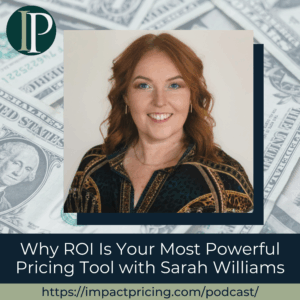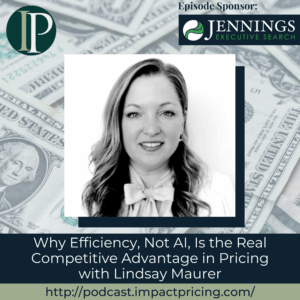Yann Gaucher is a results-driven technology business leader experienced in pricing and licensing, as well as delivering initiatives that impact revenue, market growth, customer acquisition, and product expansion for global software companies.
He believes that success is based on keen business acumen; a deep understanding of the business infrastructures sales needs to sell products and services; a compelling ‘get the job done’ work style, and an uncompromising belief in offering the best possible solution to the customer.
In this episode, Yann walks us through what a pricing person’s role looks like and the responsibilities that go with it, and how he rose from the ranks to become the VP of Pricing.
Podcast: Play in new window | Download
Why you have to check out today’s podcast:
- Find out the most important characteristics of a pricing person, including how to communicate complex matters by breaking them into simpler concepts for easier pricing decision-making.
- Learn the pricing expert’s role in sales and project management.
- Look into the crucial role of a pricing person in the organization’s profitability.
“The ability to drive insight from data and be comfortable to put oneself out there, I think is what will drive recognition and visibility in someone’s career.”
– Yann Gaucher
Increase Your Pricing Knowledge: Become a Champions of Value INSIDER!
To sign up go to insider.championsofvalue.com
Topics Covered:
01:26 – What got Yann into a career in Pricing.
02:13 – Yann’s thoughts on product managers not focusing enough on price.
03:37 – How Yann’s roles as a business analyst and product manager helped.
07:11 – Finding a middle ground between empathy for the salesforce and fulfilling company wide objective and profitability.
09:05 – Being comfortable with data and knowing how to understand data while not necessarily being an analyst.
11:50 – What is an important characteristic of a Pricing person?
14:56 – How sponsorship helps to influence pricing decisions in an organization.
16:42 – The benefits of having mentors.
18:28 – How important is managing people?
20:16 – Describing his role as VP of Pricing.
21:38 – Does Yann’s team set the prices?
22:51 – How much product managers know about a product’s value.
Key Takeaways:
“The [pricing] role we are in is difficult. We have to have the empathy so as to help the salesforce promote the product. At the same time, you have to champion the company-wide objective and profitability aspects to enable you to find the right middle ground. Sometimes it’s not easy to please everybody in that room.” – Yann Gaucher
“You have to understand what will help you create that opportunity, and when it comes down to pricing, be able to interpret the data and extract insight, as it is crucial.” – Yann Gaucher
“The understanding of the data is the key because it indicates how a given organization is structured.” – Yann Gaucher
“Drive and leadership are key characteristics of a good pricing person. People will rarely come to you and tell you what to do and when they want it. You have to be able to be proactive about what to look for and what needs attention and be able to make the case and especially communicate complex concepts simply. – Yann Gaucher
“Pricing is one of the functions I think where it’s very easy to drown in data and be in analysis paralysis, and you need someone who can break up that breadth.” – Yann Gaucher
“I had the chance to have a couple of mentors who I was able to rely on. They were mentors, more in the sense of growing up as a person, than just as a manager and pricing.”– Yann Gaucher
Connect with Yann Gaucher:
Connect with Mark Stiving:
- Email: [email protected]
Full Interview Transcript
(Note: This transcript was created by an AI transcription service. Please forgive any transcription or grammatical errors. We probably sound better in real life.)
Yann Gaucher
The ability to drive insight from data and be comfortable in putting oneself out there, I think is what will drive recognition and visibility in someone’s career.
[Intro]
Mark Stiving
Welcome to Impact Pricing, the podcast where we discuss pricing, value, and the career-oriented relationship between them. I’m Mark Stiving. Today is the second episode of our season of Pricing Executives. We are going to do this for five to ten episodes. Looking forward to learning how to help pricing people grow their careers and how pricing executives think. Today our guest is Yann Gaucher. Here are three things you want to learn about Yann before we start. He started his career in product management. We’re going to learn more about that in a few seconds. He worked for a little while as a business analyst and then finally moved into pricing at Symantec about fifteen years ago. He’s worked his way up so he’s now VP of Pricing and Packaging at Informatica. Welcome, Yann.
Yann Gaucher
Thank you very much for having me.
Mark Stiving
Okay, so I always ask, how did you get into pricing in the first place?
Yann Gaucher
It’s been kind of a logical progression because, you made the point, to study product management, one of the key roles of product management is to understand the market, the customers, how they buy and the value they are willing to assign to a product. So pricing and figuring out what level of pricing to apply to a specific product was part of the job. As I moved to the US at the time, one thing led to another, opportunities presented themselves in that space more specifically and I had the background from my initial product management years of experience.
Mark Stiving
Now I find that interesting. I was an instructor for pragmatic marketing for a long time and I found that product managers didn’t focus enough on price.
Yann Gaucher
It is true and it’s interesting because I did start as a product manager. I discontinued it and during my last few years at Symantec I went back into product management. During that period of time the industry and practice shifted a lot from the waterfall to the Agile methodology. The concept of product manager was relocating to a product owner, which is very much taken care of and I worked very closely with their engineering team. But you also have the concept of an outward or outbound product manager who is supposed to be more focused on the market trend and the customer aspect. I think from my perspective that was more of a traditional management function. Now, given that my first years of experience as relief measures were in a region, they were in Europe, so I was not a quad nut on a product per se. I was the extension of the broader product management organization in Europe, so I was representing their portfolio. So, by default, I had more of an outbound Product Manager profile than the more traditional technologists that you might be used to.
Mark Stiving
Nice. So you were also a business analyst for a little while. Do you think those two jobs helped your understanding of pricing?
Yann Gaucher
They did. The reason they did was because of space. I was a business analyst so when I moved into the US, my function kind of shifted a little bit and we started looking at sales tools to really streamline the sales process. A lot of what I was doing in the region was putting out
pricelists walking without distance. To get them to understand discounting behaviors we looked at automating some of those practices internally to try to get out of the massive Excel spreadsheet that someone has to crunch every month or every quarter. So I ended up being a business analyst on the number of sales tools, from the traditional price list as a self-serve into a custom portal for Salesforce, and then from there into the quoting side of the Salesforce automation side of things. That basically allowed you to get dirty doing quoting, discounting, sales calls, territory assignments, everything that influenced pricing. I think that that experience, the first one giving me an edge, is nothing more of that into an experience about what really happened after you price something, and understanding that, and that I think has been very useful in upstream – having a better sense of how to package and price your offerings.
Mark Stiving
Okay, so before we fill in the middle part of your career, I want to ask you, what do you think was the key to being promoted to a VP level in Pricing? What makes you different than all the other pricing people who can’t get that high?
Yann Gaucher
I think it’s two things. It’s one in my view, the pricing spaces typically, I kind of forget it as three main job description: there is the upstream where you work very closely with product management and the market on the more strategic side to define packaging and pricing. Then there is the execution piece, which is now how do you put down on paper? How do you secure the price you have, how do you make all the operational components work along with that pricing and support it, and how you can report on it. And then there is the entire helping sales figure out how to position a product versus another and how to license it. My experience pretty much throughout my career has given me a good and very strong backbone on the last two, the operational side and the self-support, because I know how sales have to deal and actually consume it. And I think that ability to have that breadth of expertise from the setting up of the pricing all the way to the actual consumption and day to day use of it, I think is a key differentiator. In that respect. It gives you a breadth of view across what the pricing effects that, I think, required at that level to be able to have some critical thinking and actually just logical approach to packaging and pricing an offer.
Mark Stiving
Yeah, let me toss out something else. I want to get your opinion on this if I could. I absolutely agree that this level of expertise and knowledge and all these different areas is going to help you dramatically. I think it’s also an empathy for the roles of the people that are in all those spots, right? It isn’t us telling them, ‘Hey, you have to go do it this way,’ but it’s figuring out how to help them be successful in their role. What would you comment on that?
Yann Gaucher
I would completely agree with you. I mean there is a balance in the role we are in but it is difficult because on one hand, we have to have that empathy for helping the salesforce promote the product, and at the same time have the company-wide objective and profitability aspect We also need to go and champion the finding of the right middle ground. Sometimes you know it’s not easy to please everybody in that room. You have to be comfortable with actually being not the most liked person in the company most of the time, and carry that thought with you and be comfortable with it. You tend to say no quite a bit but what I lack in what we do is, especially in certain companies, I mean, the one I’m on right now he’s pretty good about this, it’s been very receptive to feedback and ready to adjust and tweak the way we do things to just keep optimizing it. So it’s continuous change, you have to be comfortable with ongoing change in one side. But it’s also being able to walk yourselves on a day to day basis and have a better sense of how the customer perceives what you actually are putting out there. And whether you are actually doing it right for the market trends developing into or whether you are totally in your ivory tower and being disconnected. And I think that’s what I like is, that kind of function is that it puts you very close to the sales force on the field to actually have that directive.
Mark Stiving
Yeah, I was a salesperson early in my career and so I have this ton of empathy for salespeople. And I think that’s helped me in my pricing, thinking, and career a lot as well. Yeah, I agree. One of the things that you haven’t mentioned, which actually I find surprising, is data analytics. A lot of pricing people are focused on a ton on data. Has that affected your career? Is it important or is that just the career path that you’ve taken and the types of industries you’ve been in?
Yann Gaucher
It’s a little bit of both, I would lie if I was to tell you that from the outset. I had my career plan to get here. So, like everybody else, it’s a little bit of abundance, right? But at the end of the day you create your own opportunities. You know, throughout my career, something was exciting, interesting and I just went for a ride. I mean, no one brings something to the plate for you to go for it. You have to understand what will help you create that opportunity and when it comes down to pricing, be able to interpret the data. Extracting an insight from it is crucial. So I am not a data analyst by any stretch of the imagination but I can you know, hold all my ground to a certain extent. By and large, as a pricing professional, it’s either you have an analyst-specialist who is available to you to actually, you know, support your decision process. But data analytics and data mining are very important when it comes down to what we do. Where it becomes challenging is when you introduce a new product where you don’t have all the historical data available to you to do that. So here, it’s more marketing. The product is exciting because you need to do more research and that’s where you get closer to the field. That’s kind of what I tend to like to be called pure data analytics. But that analytics, you can escape it for that type of function, it’s how you will drive your decisions in terms of where to package and price. It is also how you will track success against your KPIs that you’re putting in place as part of the decision of pricing production.
Mark Stiving
Yeah, I think I’ve come to the same conclusion that you did. And that is that you have to be comfortable with data and understand data, but you don’t have to be the analyst, right? You don’t need to know analytics and go do the data mining and crunch all through. I think that makes a ton of sense.
Yann Gaucher
It is true and I think the understanding of the data is the very key because it will always be a function of how a given organization is structured. It shows how they record their transaction, how they’re recording their system and indicates they are able to correlate data points and understand what they mean. It is the critical capabilities that a pricing professional needs to have. If you don’t know what you’re looking at and putting numbers together and crunching them and driving correlation between different data elements, then you really need it. So that point that you’re making is very important.
Mark Stiving
So I noticed on LinkedIn throughout your career, you’ve had lots of different pricing people working for your pricing teams, I’ll assume you have a bunch now. What are the characteristics of a really good pricing person, someone who you say you’re going to promote in the near future?
Yann Gaucher
Drive and leadership. In that space, people will rarely come to you and tell you what to do and when they want. You have to be able to be proactive about what to look for and what needs attention and be able to make the case, and especially communicate complex concepts simply. What I see too often, and that’s really where I think from a career perspective, someone has to be able to make the job right. It’s when you are in the trenches and you do the work, you lead, you breathe it, you are down into the detail. When it comes time to be able to articulate that to an executive and be able to drive decisions, you can talk at that level of detail, you just have to be able to bridge that communication gap and be able to articulate complex problems in simpler ways so the decision can be made. Pricing is one of the functions I think, where it’s very easy to drown in data and in analysis paralysis, and you need someone that can break up that breadth – and that person is the one that I will promote.
Mark Stiving
You kind of have to be able to have a really narrow focus and then bring that out to a really broad focus all at the same time.
Yann Gaucher
Correct. And that’s why that broader understanding of the organization helps with it
because now you have a better reference of what’s important or relevant for the different constituency and it helps you kind of fill in that conversation.
Advertisement
I love teaching pricing and value, but I get a little frustrated. It’s hard to implement what you’ve learned after just one class. There are always nuances to what you learn in the classroom that just aren’t easy to recall when you’re trying to implement them in your own real-world project. To most, pricing feels so risky. To solve this we’ve come up with our part-time pricing expert programs. In each program I learned enough about your business to guide you as you explore and implement new pricing capabilities and new value discovery approaches. We put together three distinct programs to assist with a range of scenarios from a single project or to help a team within your company prove their decisions to developing your own in-house pricing expertise. I think pricing is fun. And you might too if it wasn’t so scary. If a little guidance, expert counsel, and sound advice would be a benefit on your next pricing initiative, please reach out to me at [email protected]. We only have room for a few more companies.
Mark Stiving
One of the things I’ve seen with a lot of pricing people that I’ve worked with and talked with is they feel frustrated that they don’t have influence inside their company. I would interpret that as them having the drive to figure out this is something we need to go change, here’s something we need to do, but they didn’t have the leadership skills to convince the company to move in that direction.
Yann Gaucher
Sometimes it comes down to sponsorship as well. I think the present function is the one that is a bit challenging because you will typically start seeing a stronger focus on that space in a bigger organization. Otherwise, what’s very important is to find the sponsor who will basically drive that sort of decision that controls the decision-makers. Oftentimes a company will bring a consultant on board. And the other day, the consultant will basically come back down to the same recommendation as someone else in the organization, but you spend a million on it. And what’s the difference? Well, it’s someone else outside of the organization that told you so, and you paid for it. I kind of equate finding the right sponsor to descend on it, right. They will support your own kind of view, but oftentimes, the pricing function is not looked at with the right level of credibility as it should. But the sponsor that, as maybe a GM or someone, is directly affected by the recommendation would have, I only would have credibility or relationship. And that’s kind of the way you’re used to actually influence decisions. And back to the question you asked earlier, the spotlight, it’s not something that someone in pricing needs to look for in that function, because typically it’s not on pricing function that shines, it’s basically on the people that drives the project or the product that can benefit from it.
Mark Stiving
Yeah, I think pricing people have a ton of ability to move the needle and profitability, but we rarely get the glory.
Yann Gaucher
Correct. You’re spot on. Yes, absolutely.
Mark Stiving
Okay. Right. That’s absolute. When you think about how much power there is here. So how did you learn what you know? Did you have mentors?
Yann Gaucher
I had mentors and I, honestly, I was curious. I will just go and ask questions. So I was lucky that when I relocated to the US, the person I was looking for at the time was a great people development person. So that helped a lot. And then yes, I had the chance to have a couple of mentors that I was able to rely on. They were mentors more in the sense of growing up as a person, as a manager, more than just pricing. To be honest, I don’t have a formal pricing background. I don’t have an MBA, which is, in the pricing side, sometimes most of that type of profile used for that. It is by learning by association with other people that I was exposed. And just by trying it out, I would have people that actually are good at doing some of that pricing. And I will just insert myself in this project, and maybe I didn’t know much about it, but people just don’t look like it, but they welcome assistance and helping some of those pretty nifty projects and you’ve done a lot by actually doing that and monitoring forms of exercise.
Mark Stiving
Yeah. to share with you and our listeners. Last week’s episode, our VP of pricing, didn’t even have a bachelor’s degree. So see? You can do it.
Yann Gaucher
It’s again, it’s about creating your own opportunity and actually putting yourself out there and just learning from it.
Mark Stiving
Yeah, absolutely. Absolutely. So one of the things you said was your mentors taught you more about management. And I got to say, I think that was so true in my life, too. I could learn the pricing stuff. Give me a book, right, here we go. But learning how to deal with people was so hard for me.
Yann Gaucher
Yes, and it still is for me in some ways. So that sponsorship comment submitted earlier, I had the chance with a couple of managers who actually were guiding me in that respect, because it’s not intuitive, right? Just, why would I want to have someone give all that power work to someone else and want him to get the glory and actually prove the product for me? Well, at the end of the day, it’s all about influence. There is a great book about influence where you focus on what you can influence first, and you get good at it, and then you can expand from there. I recommend that read for other folks. It’s really what it is about our role, really around influencing, identifying trends, identifying patterns that are relevant for certain people so they can make decisions from it and as a snowball effect, improving profitability or top-line revenue or margins. We are all enablers in that sense. And yes, if you have the chance to have someone who can coach you in navigating the people side of the job and sometimes the dynamic of a company as well, is very important.
Mark Stiving
It was funny when I was in sales 100 years ago, I would listen to tapes and I remember a Zig Ziglar tape saying, you can have anything you want as long as you help enough other people get what they want. What’s fascinating about this world of pricing is in a lot of ways, it’s exactly that, but it isn’t us selling outside customers. It’s us selling internally and determining whether we can help enough other people in our company be successful in their role. Once we do that, oh my gosh, we become invaluable to the company.
Yann Gaucher
They come to you, they come to you and they seek your assistance?
Mark Stiving
Yeah. This is absolutely fascinating. So who else have you, you of course are the VP of pricing which means you get to set all prices. Is that right?
Yann Gaucher
So yes, I work upstream with Project Management. We also have a strategic organization that works a lot more on the three, four-year planning. We work very closely with each other to make sure that whatever we put to the market is consistent with the strategy we want to go to. They also provide us with a lot of the analytical power and the know-how to sum up the market. So we do that. A lot of my time in the current role is also spent on making sure that all the pieces come together and work so when an order is placed and pricing flows to the right system, the right financial group recognizes it properly. There is such a big aspect of pricing in making sure that once you come up with a new way of packaging and pricing, it is an offering that everybody in the organization can support. Sometimes we forget that we put something out there. We just think it will work and then find out what to do with it and then fulfil the shipping, which doesn’t know what to do with it. You still have that aspect which needs to be taken into account as well. It does affect your cost most of the time. Cost in this day and age of cloud is a critical factor to actually understand. When you price, you price it correctly because you understand what it costs to deliver it. It’s a kind of cycle that just has to keep going.
Mark Stiving
I have to tell you, when I asked that question it was a little tongue in cheek, so I want to ask it more directly because I want to understand a little bit. Okay, back whenever I was in pricing, I never set a price. Right? All I ever did was teach or coach product managers or business managers on how to set prices and how to think about pricing. So does your team actually set prices?
Yann Gaucher
Actually it’s a blend, you’re right, we spent a lot of time with the product managers to guide them through thinking because yes, a lot of them are technically-centric. But then the other day they are the ones that understand their market, the most being the dynamics. And where we come in is with the analytics which come up with a proposed range of prices that are based on whatever assumption or parameters we have set for a given product and will be acceptable. And then when they approve, do we set the price? Well, we are not the ones putting the rubber stamp on it. One way was all the number crunching was the final number, let’s say, we think that’s the one you should put in there. And then they decided the other one to run with. So technically, no, technically the product managers is the one that just sets the price ultimately.
Mark Stiving
Well, if you think about it and if you believe in value-based pricing, which I’m going to assume that you do, then the product managers know the value of our product better than we do, by far.
Yann Gaucher
And they’re accountable for it. I think where we come in, which is a bit different in this role than I’ve had with this previous role, I have that packaging portion of my title. When you work as a product manager, it’s very technical as they want to monetize every single knob and labor of their product. Now you end up with a portfolio that is perhaps not the most friendly for sales position consumers to consume. Part of our role, of my role, is to say, ‘Do you really think that little things should be packaged on their own on price, or should it be part of a bigger offering?’ It’s really probing them to see. ‘Will you be able to stand behind it and drive a specific forecast on that thing alone?’ ‘How do you figure it out?’ So that is a bit unique I think in the role I’m in today than I was in the past. So pricing stays within the packaging but we do have a decent influence on it.
Mark Stiving
Yeah, I could see that and nowadays you see packaging put in the product marketing groups a lot. But it still is so tightly related to the pricing and how do we charge for things. This has just been a fabulous conversation. Can I ask the one question I always end with?
I just want to ask, what’s one piece of pricing advice that you would give our listeners that you think could have a big impact on their business?
Yann Gaucher
On their business or on their career?
Mark Stiving
Well, let’s do their career, that’s even better.
Yann Gaucher
Okay. And I think from a career perspective, the ability to drive insight from data and be comfortable putting oneself out there and exposing yourself in terms of coming up with a recommendation, I think is what will drive recognition and visibility in someone’s career. I think that what I found is important because there are very few of us in a pricing space and people are just looking for them. So if you put yourself out there and you are comfortable making some changes, that’s what works. That’s a perfect answer.
Mark Stiving
Thank you so much and thanks for your time today. If anybody wants to contact you, how can they do that?
Yann Gaucher
Well, my profile on LinkedIn is the best way as they can always send me messages there. I typically respond pretty quickly. So welcome to anyone asking me to connect or to have some questions.
Mark Stiving
Excellent. Thank you, Yann. Episode 82 is all done. Would you do us a huge favor and leave us a review? I promised I was going to start reading reviews and so Grayson IP wrote a review on iTunes titled, ‘Thoughtful discussion, but too brief’. He says, “Great guests with meaningful pricing insights, the episodes are a bit too short to deep dive, feels too short and time-constrained. This type of meaningful discussion would benefit from more detailed interviews. Appreciate the conversations though, the interviewer is seasoned and smart.” Oh, and he still gave us five stars. So thank you, Grayson. I appreciate that. So maybe we’ll do a longer-form interview one day. If you want a longer-form interview, send me an email that says, ‘Here’s the guest that you had in the past who I’d really like to know more from.’ and I’ll see what I can do. Also, don’t forget to join our free community at championsofvalue.com. That’s where I post all of my free content. You’ll be able to see my memes, my blogs, my videos, my podcasts, everything is up there. If you have any questions or comments about the podcast or about pricing in general, feel free to email me, [email protected]. Now, go make an impact!
Tags: Accelerate Your Subscription Business, ask a pricing expert, pricing metrics, pricing strategy
















